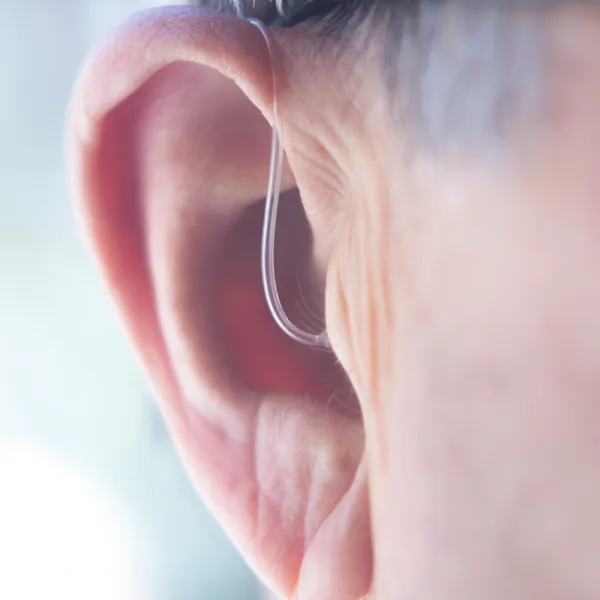
When we take medicine, we trust it will improve our health. But what if a medication meant to help comes with a hidden risk to your hearing? This risk is known as ototoxicity, and it refers to the potential of certain medications to damage the inner ear, leading to hearing loss, tinnitus (ringing in the ears), and balance problems. In this guide, we provide a detailed overview of what ototoxicity is, including early warning signs, known ototoxic medications, and factors that can increase the risk of medicine-induced hearing loss.
What Is Ototoxicity?
Ototoxicity, literally meaning “ear poisoning,” refers to the toxic effect that certain medications can have on the inner ear. Our inner ear houses delicate hair cells that convert sound waves into electrical signals, allowing us to hear and maintain balance. Unfortunately, certain medications can damage these hair cells, leading to ototoxic hearing loss, also known as medicine-induced or drug-induced hearing loss.
Ototoxic hearing damage can occur through various mechanisms, including:
- Direct toxicity: Some medications directly destroy or impair the function of the delicate inner ear hair cells.
- Reduced blood flow: Certain medications can constrict blood vessels in the inner ear, limiting the oxygen and nutrients vital for hair cell health.
- Interference with neurotransmitters: Some medications can disrupt the neurotransmitters essential for proper inner ear hair cell function.
Drug-induced hearing loss is permanent, but awareness of the early warning signs can help increase the likelihood of early diagnosis and reduce the risk of further damage.
Symptoms of Medicine-Induced Hearing Loss
It’s important to note that the first sign of ototoxicity is often not hearing loss, but rather a variety of other symptoms. In fact, some of the most common early symptoms of ototoxicity are tinnitus (ringing in the ears) and/or balance issues.
Here are some common signs of medicine-induced hearing loss to watch for:
- Ringing or buzzing in the ear (tinnitus)
- Difficulty maintaining balance and/or dizziness
- Pressure in the ear
- Trouble comprehending speech
- Difficulty hearing high-pitched sounds
The earlier you notice possible symptoms, the sooner you can begin taking proactive steps to avoid further damage to your hearing. Early symptoms of medicine-induced hearing loss are typically noticeable soon after taking the drug for the first time. However, this is not always the case.
Sudden vs Gradual Ototoxic Hearing Loss
While symptoms can be noticeable right away, in some cases, ototoxicity can develop gradually. It’s even possible for symptoms of damage to emerge up to five years after starting treatment.
The severity and speed of ototoxicity often depend on the dose and duration of exposure. High doses or prolonged exposure to ototoxic substances are more likely to cause rapid hearing loss. Conversely, lower doses or shorter exposure times might result in gradual damage that takes years to become noticeable.
Furthermore, everyone varies in their susceptibility to ototoxic damage. Some people may have genetic predispositions to auditory health issues that make them more vulnerable to a faster onset of hearing loss.
Medications Known to Cause Ototoxic Hearing Loss

According to the American Speech-Language-Hearing Association (ASHA), there are over 200 known ototoxic medications and chemicals. These substances range from common over-the-counter (OTC) drugs to prescription medications, and even some herbal treatments.
OTC Medications That Are Ototoxic
Over-the-counter (OTC) medications can be purchased directly from pharmacies or certain retailers without the need for a prescription from a healthcare professional. It is important to know that some of the most widely used OTC medications are ototoxic, including many pain relievers.
OTC painkillers: Nonsteroidal anti-inflammatory drugs (NSAIDs) are a type of OTC pain reliever that have been known to have ototoxic effects. Common NSAIDs include aspirin, ibuprofen (Advil, Motrin), and naproxen (Aleve).
The risk of ototoxicity from OTC medications is generally low for most people, especially with recommended dosages and short-term use. However, for people more susceptible to ototoxic effects, even normal use of these drugs can potentially lead to permanent hearing damage. High doses or prolonged use can also increase the risk of ototoxicity.
If you notice any symptoms of ototoxicity while taking OTC drugs, it’s important to stop taking them immediately and seek medical care.
Ototoxic Prescription Medications
To minimize the risk of hearing loss, awareness of the ototoxic potential of prescription medications is essential for both healthcare professionals and patients. Some of the most common categories of ototoxic prescription medications include:
Antibiotics: Some common antibiotics, especially those in the aminoglycoside class, can cause ototoxicity. These include gentamicin, tobramycin, and amikacin. With prolonged use, powerful antibiotic treatments such as vancomycin can also cause damage to the auditory system.
Antidepressants: Certain tricyclic antidepressants and selective serotonin reuptake inhibitors (SSRIs) have been linked to ototoxicity. Common examples include amitriptyline, sertraline (Zoloft), and fluoxetine (Prozac).
Chemotherapy drugs: Some chemotherapy agents commonly used to treat cancer can have ototoxic effects, including carboplatin and cisplatin.
Loop diuretics: Medications like furosemide (Lasix) and bumetanide (Bumex) are used to treat conditions such as edema and hypertension but can also be ototoxic at higher doses.
Quinine-based medications: Quinine-based drugs used to treat malaria, babesia, and other parasitic diseases can have ototoxic effects. Prescription examples include chloroquine phosphate (Aralen), quinacrine hydrochloride (Atabrine), and quinine sulfate (Quinam).
Given the necessity of some of these medications, usage is not always avoidable. It’s important to watch for early signs of ototoxicity when taking any of these medications and inform a healthcare professional immediately if you notice any symptoms.
Risk Factors of Ototoxicity

While ototoxic medications can affect anyone, certain factors can increase the risk of medicine-induced hearing loss including:
Co-Administration of Ototoxic Drugs: Taking more than one ototoxic drug can amplify the risk of developing medicine-induced hearing loss.
Age: Older adults may be more susceptible to ototoxicity, due to the natural aging process of the ear. Older adults also have a higher likelihood of taking multiple medications, which increases the risk of co-administration of ototoxic drugs.
Pre-Existing Health Conditions: Underlying health conditions such as kidney disease can compromise the body’s ability to metabolize and eliminate drugs from the body, also known as reduced drug elimination. This can increase the likelihood of inner ear damage.
Genetics: Some genetic predispositions can make individuals more susceptible to the effects of ototoxicity.
Ototoxicity Prevention
Unfortunately, many ototoxic medications are often lifesaving and necessary for people who need to treat underlying conditions. Additionally, according to ASHA, while researchers are looking for a way to prevent ototoxicity, there is currently no way to reverse the effects of medicine-induced hearing loss.
To reduce the risk of ototoxicity, and safeguard your overall health as well, it is important to discuss existing hearing or balance problems with your doctor and any new symptoms experienced during treatment. This will enable your provider to make informed decisions regarding medication management and provide appropriate support and resources as needed.
Monitor Your Hearing Health with Regular Hearing Exams
Regular hearing exams, including baseline evaluations before starting potentially ototoxic medications are essential for detecting any changes in hearing function as early as possible. This allows for timely intervention and adjustment of treatment plans if ototoxicity is detected.
Don’t wait until it’s too late—schedule a hearing exam at an Audibel clinic near you today.







Have a question or Comment?